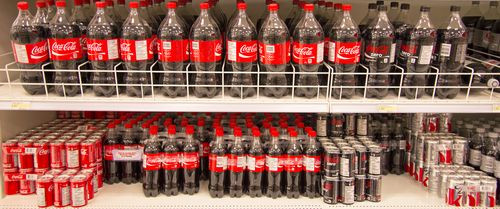'Share A Coke': How Beverage Giant Coca-Cola Uses Emotional Marketing To Get Consumers To Make Unhealthy Choices

It’s well known that many companies use tricky advertising techniques in order to reel in their customers. The food industry is one of the biggest culprits. Coke’s “Share A Coke” campaign is a prime example of how soft drink companies play on the emotions of their customers.
Here’s how it works: Coca- Cola, Diet Coke, and Coke Zero have taken their iconic logos off of the bottles and replaced them with thousands of different people's names. This personalization is in itself a very attractive thing to many consumers. For years, companies like Coca-Cola have been using tactics such as cartoons, characters, and many other things to appeal to children. Now the “Share A Coke” campaign is basically using the same concept, except it targets a broader demographic: children, young adults, and adults.
According to Kath Dalmeny, author of a report by The Food Commission, manufacturers use sneaky ways to promote their products to children. “Marketers are using techniques that fly under the radar of parental control, using new technologies to build direct relationships with children,” she wrote in the report. “Alongside traditional advertising techniques, many companies are increasingly using the Internet, product placement in computer games, interactive online gaming, and mobile phones to push fatty, salty, and sugary foods on children too young to understand the serious long-term consequences of an unhealthy diet.”
The same idea applies to this new Coca-Cola campaign. By personalizing their bottles, the company is appealing to an audience that appreciates this uniqueness. According to a 2013 report by Forbes, a Bain survey of more than 1,000 online shoppers found that despite 10 percent of customers having the option to customize, 25 to 30 percent were interested in the idea. “If 25 percent of online sales of footwear were customized, that would equate to a market of $2 billion per year,” Forbes reported.
This new campaign could be a way to increase sales, since those numbers are down. If you look at soft drink industries overall, the sales have been declining over the past few years. This could be a result of people being more health-conscious, or they’re being more aware of what exactly goes into these products and choose to abstain.
Nevertheless, Coca- Cola identified this setback and found a way to skirt around this issue. When the campaign first ran last year, it lifted consumer perception and sales both, according to The Guardian. “Young adult consumption increased significantly, up by seven percent. The campaign also earned a total of 18,300,000-plus media impressions, and traffic on the Coke Facebook site increased by 870 percent, with page likes growing by 39 percent.”
This would make sense because people, especially youth, like customized products, namely the kind with their name on it. Go to any tourist shop and you'll be sure to find a rack with a plethora of keychains with names A-Z to choose from — people hold a closer connection to these products.
Social media also plays a role. Coca- Cola has been using the hashtag #shareacoke to spread the campaign, and people are snapping, Facebooking, and Instagramming photos of their bottles.
This is a major problem for consumers, considering the fact that soft drinks play a major role in the obesity epidemic in America. According to the Harvard School of Public Health, rising consumption of sugar drinks is a major contributor to different diseases. A fact sheet cites four different studies that show sugary drinks like soda increase the risk of obesity, diabetes, heart disease, and gout.
If you take a look at the most recent Share a Coke commercial called, “Share a Coke This Summer,” it plays on the idea of a young summer romance. The two main characters in the commercial bond over their names printed on the Coca-Cola bottle. In the end, people are all cheering together and drinking from their personalized drinks. And while this might not exactly be a scene from the number one love story, it still has a big emotional factor that appeals to many people.
Even in the video description, Coca- Cola writes: “This summer we're replacing the Coca-Cola logo with hundreds of names. Which means when you start sharing with friends, good times will just keep growing... exponentially.”
These marketing tactics are similar to the tobacco ads of the past, where big advertising companies would play on the emotional side of people to sell their cigarettes. Using style, good-looking people, and playing on the coolness factor are all ways cigarettes were pushed onto consumers — this emotional marketing tactic can now be translated to soda.



























